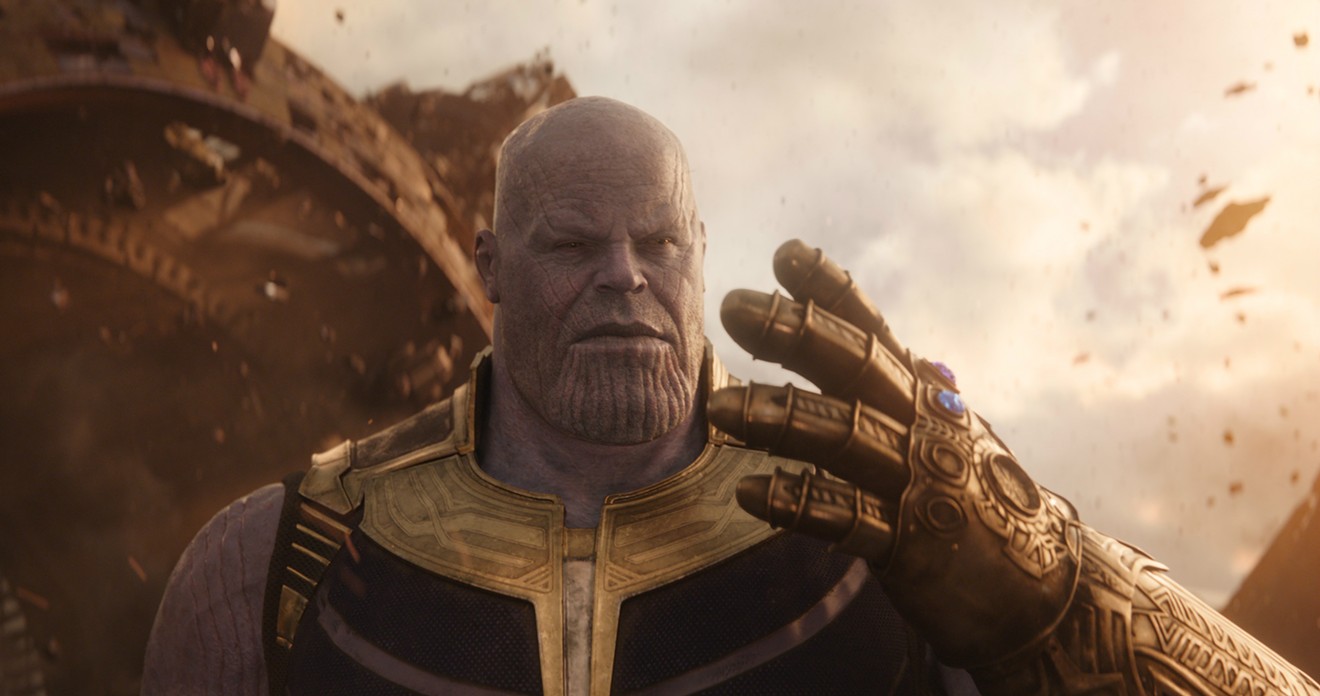The carping didn’t start until everyone was filing out of the theater, an eternity nowadays: “They’re just going to come back in Avengers 4,” I heard another critic say. “It’s a big ripoff.”
I’m still not sure how an epic-length blockbuster that stars an It’s a Mad, Mad, Mad, Mad World’s worth of stars — and then decimates them! — can be called a ripoff. It’s unreasonable to expect that anybody anywhere believed for more than the length of those credits that evil’s triumph is absolute, that Avengers won’t avenge again. If anything, such an audacious cliffhanger is the closest the Marvel movies have come to the spirit of actual Marvel comics. It also suggests to me the death of Tinker Bell, except in this case it's box office rather than fervent belief that will power the resurrection.
But there’s something appropriate for these times of ours about making us wait for it. About letting us imagine, for much longer than usual, the possibility that things won’t work out, that the forces of good can’t quite measure up. As we wait for Cap and Co. to come back and kapow Thanos, millions of us also are yearning for someone — say, Robert Mueller — to undo the triumph of our own bizarrely colored villain. That’s cute, but it’s not enough: The lesson of the year’s best superhero movie, Spider-Man: Into the Spider-Verse, is that any and all of us can take action ourselves, in our own ways, doing whatever we can to better our own patch of multiverse. We can’t just trust that some power greater than ours will give us a happy ending.
This country has been at that all-is-lost moment for much longer than the couple of minutes that most movies allow it and, unlike with the Avengers, there’s no guarantee it all will get set right. I say that with no desire to stir controversy. Even Donald Trump supporters believe we’re in a crisis — that’s why they’re Trump supporters. Our moment is marked by deep suspicion of other Americans, not just of their politics, but of their very motives — the urges behind their politics. To my mind, that makes moments like what I experienced at that packed Avengers screening all the more valuable: Together, in the dark, for those couple of hours, we felt and believed the same things.

Chadwick Boseman (left) and Michael B. Jordan led a predominantly black cast in Ryan Coogler's rousing Black Panther.
Courtesy of Walt Disney Pictures
The movie experiences I treasure most from this year found me sharing moments and laughs and tears with strangers who, just before and after the house lights dimmed, I might have been arguing with on Twitter. Together we roared through Game Night and Blockers, though my opinion seems to be in the minority in wishing that Jesse Plemons, Rachel McAdams and Leslie Mann had won greater recognition for their superb comic turns. We partied with that it’s-about-time classic Crazy Rich Asians and the why-not? Mamma Mia! sequel. A Quiet Place hushed the rowdy crowd I saw it with ten minutes in and kept them church-mouse silent until the end. And while I think the bold Annihilation makes a hash of Jeff VanderMeer’s singular novel, I also gripped my armrests plenty tight when that screamo bear showed up.

Bradley Cooper (left) and Lady Gaga set the contemplative mood in A Star Is Born.
Neal Preston/Courtesy of Warner Bros.
For all that, though, movie-going peaked for me with that stretch of blazing summer releases satirizing and examining race and class and whatever else in America: the pained near-musical Blindspotting, the scabrous and unclassifiable Sorry to Bother You and the furious BlacKkKlansman. Spike Lee directed the last of those, and feuded a bit with the director of the second of those. But all three are touched by the spirit of his early studio work — movies like Do the Right Thing and Jungle Fever that told their uncompromising truths and somehow played every city in America.

John David Washington (right) and Adam Driver played major roles in making Spike Lee's BlacKkKlansman a summer hit that was touched by the spirit of the director's early studio work.
Courtesy of Focus Features
Spike Lee’s movies did play Kansas, of course. And after years of the boonies not getting sharp-elbowed wide releases, Sorry to Bother You and Blindspotting played there, too. With luck, they split some heads open and seeded the gray inside with new truths, new outrage, new possibilities for what life could be — and what movies can say.
I understand that it’s a preening sort of nostalgia to worry that kids in Kansas don’t have a media experience similar to what I lucked into growing up. They don’t have video stores where they can make odd discoveries. But they almost certainly have Netflix, which stands this year as the end and start of all things cinematic, a sort of Thanos that seems to lay waste to everything it doesn’t touch. For too many viewers, movies not available to stream on the world’s most popular platform may as well have dissolved into dust.
I’m sympathetic to the complaint that Netflix offers too few older films, and like any movie-mad weirdo, I mourn the loss of the boutique streaming service FilmStruck. But this year Netflix bought and distributed Tamara Jenkins’s brilliant post-bohemian comedy Private Life, Alice Rohrwacher's hypnotic neo-fable Happy as Lazzaro, Daniel Goldhaber’s sneaky online thriller Cam, Sandi Tan’s searching road-move doc Shirkers, Jeremy Saulnier’s vicious Hold the Dark, the Coen brothers’ dada-Western spree The Ballad of Buster Scruggs, Sara Colangelo’s unsettling study of sociopathy The Kindergarten Teacher, Orson Goddamn Welles’s The Other Side of the Wind and the year’s best narrative feature, Alfonso Cuarón’s masterpiece Roma. I even loved Andy Serkis’s cast-off, kid-terrifying talking-animal adventure flick Mowgli: Legend of the Jungle. You can’t set your watch to one of these movies; I only wish we could watch them together.












